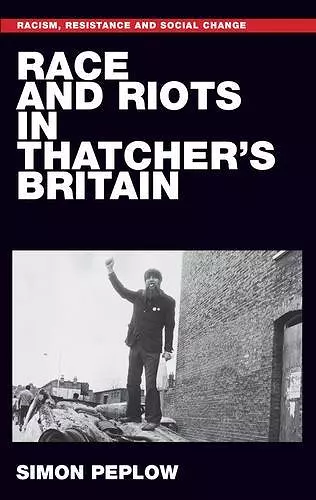Race and Riots in Thatcher's Britain
Format:Hardback
Publisher:Manchester University Press
Published:21st Jan '19
Currently unavailable, and unfortunately no date known when it will be back

This powerful and original book locates the anti-police violence that spread across England in 1980-1 within a longer struggle against racism and disadvantage faced by black Britons, which had seen a growth in more militant forms of resistance since the Second World War. It explains these disturbances as ‘collective bargaining by riot’ – attempts to increase political inclusion by this marginalised group. Through case studies of Bristol, Brixton and Manchester, the book explores the actions of community organisations in the aftermath of disorders. Highlighting the political activities of black Britons and the often-problematic reliance upon ‘official’ sources when forming historical narratives, it demonstrates the contested value awarded to public inquiries – contrastingly viewed by black Britons as either a method for increased political participation or simply a governmental diversionary tactic.
'Overall, this book enlivens, reinterprets, and repurposes previous analyses of both black history and protest studies, bringing them into clearer focus. As a national study, it retains (primarily) a state-orientated focus, while using urban case studies to illuminate certain problems, with the Manchester and Liverpool case studies of greatest interest for Transactions readers. Peplow makes a convincing case in how we examine historic protest linked with race and ethnicity, and his approach can inform future studies, offering a natural continuation to Peter Shapely’s recent Deprivation, State Interventions and Urban Communities in Britain (Routledge 2018), which itself ends before the riot build-up Peplow covers after 1979.'
Dr Marc Collinson, Bangor University, Transactions of the Historic Society of Lancashire and Cheshire, Vol. 168, 2019
'An engaging, deeply researched and accessible contribution to the field – an excellent introduction to both the disorders of 1980–1981 and the processes and limitations of public inquiries. If it does not quite live up to the breadth signalled in the title, this is only an indication of the extent of research remaining to be performed in what is now a particularly timely area. For those wishing to carry out such research, or indeed involved in the types of struggle that form its subject, this book is an excellent place at which to begin.'
Social History
ISBN: 9781526125286
Dimensions: 234mm x 156mm x 19mm
Weight: unknown
272 pages